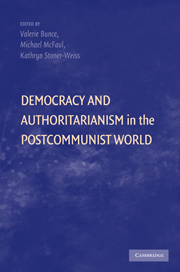Book contents
- Frontmatter
- Contents
- Prologue
- PART I WAVES OF REGIME CHANGE: FROM DICTATORSHIP TO DEMOCRACY…AND BACK?
- PART II ENCOURAGING DEMOCRACY: THE ROLE OF THE EUROPEAN UNION
- PART III CHOOSING REGIME CHANGE: DEMOCRATIZING ELECTIONS
- PART IV RESISTING REFORM: BACKSLIDING DEMOCRACIES AND ENDURING AUTOCRACIES
- 9 Resistance to Contagion
- 10 Comparing Oranges and Apples
- 11 Contagion Deterred
- 12 A Horse of a Different Color
- Epilogue
- Index
- References
9 - Resistance to Contagion
Sources of Authoritarian Stability in the Former Soviet Union
Published online by Cambridge University Press: 05 June 2012
- Frontmatter
- Contents
- Prologue
- PART I WAVES OF REGIME CHANGE: FROM DICTATORSHIP TO DEMOCRACY…AND BACK?
- PART II ENCOURAGING DEMOCRACY: THE ROLE OF THE EUROPEAN UNION
- PART III CHOOSING REGIME CHANGE: DEMOCRATIZING ELECTIONS
- PART IV RESISTING REFORM: BACKSLIDING DEMOCRACIES AND ENDURING AUTOCRACIES
- 9 Resistance to Contagion
- 10 Comparing Oranges and Apples
- 11 Contagion Deterred
- 12 A Horse of a Different Color
- Epilogue
- Index
- References
Summary
Why did the “third wave” of postcommunist transitions sweep away some autocrats but leave others untouched? A partial explanation is that hybrid or competitive authoritarian regimes (such as Ukraine or Georgia) were more vulnerable than fully closed regimes (such as Uzbekistan or Turkmenistan) to opposition challenges. As Steven Levitsky, Harvard University, and I have argued, the “coexistence of democratic rules and autocratic methods aimed at keeping incumbents in power creates an inherent source of instability.” Indeed, each of the color revolutions occurred in nondemocratic but relatively competitive political systems. Yet, even among post-Soviet competitive authoritarian regimes, only some autocrats succumbed to opposition challenges.
This chapter examines the sources of authoritarian vulnerability through a comparison of the fate of autocrats in the seven post-Soviet countries that emerged as hybrid in the 1990s. Why did some (Armenia, Belarus, Moldova, and Russia) survive the third wave in the early and mid-2000s whereas others (Georgia, Kyrgyzstan, and Ukraine) fell to opposition forces? A comparison of these cases suggests that incumbent state and ruling party capacity are key sources of authoritarian stability. Autocrats have been more likely to hang on when they possessed at least one of the following pillars of incumbent strength: (1) a single highly institutionalized ruling party backed by a nonmaterial source of cohesion such as a revolutionary tradition or highly salient ideology; (2) an extensive, well-funded, and cohesive coercive apparatus; or (3) state discretionary control over the economy, generated either by the failure to privatize or by reliance on easily captured energy revenues.
- Type
- Chapter
- Information
- Democracy and Authoritarianism in the Postcommunist World , pp. 229 - 252Publisher: Cambridge University PressPrint publication year: 2009
References
- 1
- Cited by



